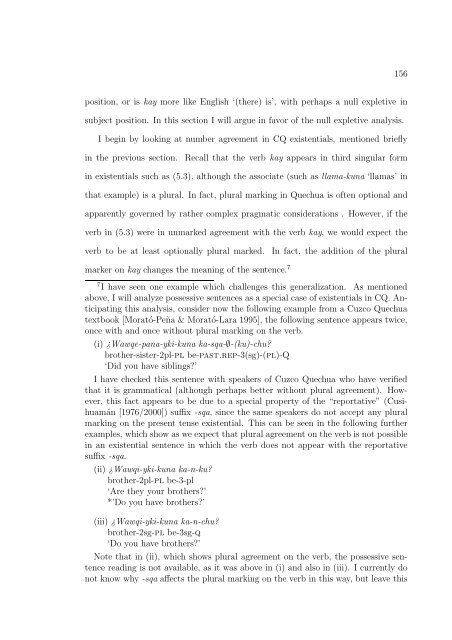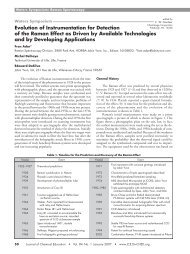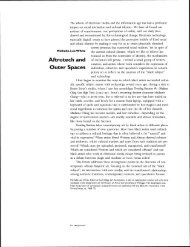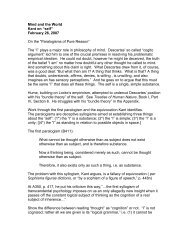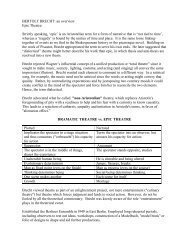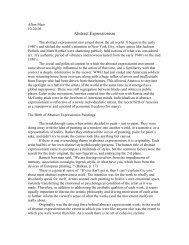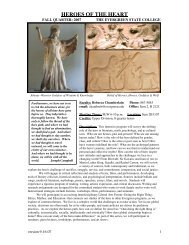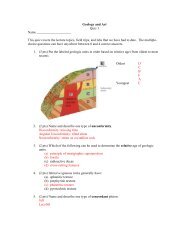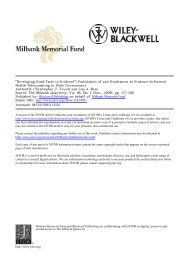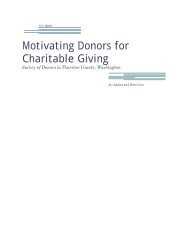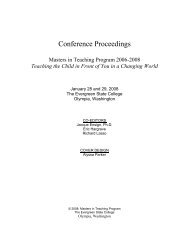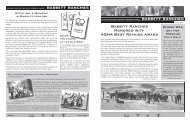the syntax and semantics of relativization and quantification
the syntax and semantics of relativization and quantification
the syntax and semantics of relativization and quantification
You also want an ePaper? Increase the reach of your titles
YUMPU automatically turns print PDFs into web optimized ePapers that Google loves.
156<br />
position, or is kay more like English ‘(<strong>the</strong>re) is’, with perhaps a null expletive in<br />
subject position. In this section I will argue in favor <strong>of</strong> <strong>the</strong> null expletive analysis.<br />
I begin by looking at number agreement in CQ existentials, mentioned briefly<br />
in <strong>the</strong> previous section. Recall that <strong>the</strong> verb kay appears in third singular form<br />
in existentials such as (5.3), although <strong>the</strong> associate (such as llama-kuna ‘llamas’ in<br />
that example) is a plural. In fact, plural marking in Quechua is <strong>of</strong>ten optional <strong>and</strong><br />
apparently governed by ra<strong>the</strong>r complex pragmatic considerations . However, if <strong>the</strong><br />
verb in (5.3) were in unmarked agreement with <strong>the</strong> verb kay, we would expect <strong>the</strong><br />
verb to be at least optionally plural marked. In fact, <strong>the</strong> addition <strong>of</strong> <strong>the</strong> plural<br />
marker on kay changes <strong>the</strong> meaning <strong>of</strong> <strong>the</strong> sentence. 7<br />
7 I have seen one example which challenges this generalization. As mentioned<br />
above, I will analyze possessive sentences as a special case <strong>of</strong> existentials in CQ. Anticipating<br />
this analysis, consider now <strong>the</strong> following example from a Cuzco Quechua<br />
textbook [Morató-Peña & Morató-Lara 1995], <strong>the</strong> following sentence appears twice,<br />
once with <strong>and</strong> once without plural marking on <strong>the</strong> verb.<br />
(i) ¿Wawqe-pana-yki-kuna ka-sqa-∅-(ku)-chu?<br />
bro<strong>the</strong>r-sister-2pl-pl be-past.rep-3(sg)-(pl)-Q<br />
‘Did you have siblings?’<br />
I have checked this sentence with speakers <strong>of</strong> Cuzco Quechua who have verified<br />
that it is grammatical (although perhaps better without plural agreement). However,<br />
this fact appears to be due to a special property <strong>of</strong> <strong>the</strong> “reportative” (Cusihuamán<br />
[1976/2000]) suffix -sqa, since <strong>the</strong> same speakers do not accept any plural<br />
marking on <strong>the</strong> present tense existential. This can be seen in <strong>the</strong> following fur<strong>the</strong>r<br />
examples, which show as we expect that plural agreement on <strong>the</strong> verb is not possible<br />
in an existential sentence in which <strong>the</strong> verb does not appear with <strong>the</strong> reportative<br />
suffix -sqa.<br />
(ii) ¿Wawqi-yki-kuna ka-n-ku?<br />
bro<strong>the</strong>r-2pl-pl be-3-pl<br />
‘Are <strong>the</strong>y your bro<strong>the</strong>rs?’<br />
*’Do you have bro<strong>the</strong>rs?’<br />
(iii) ¿Wawqi-yki-kuna ka-n-chu?<br />
bro<strong>the</strong>r-2sg-pl be-3sg-q<br />
‘Do you have bro<strong>the</strong>rs?’<br />
Note that in (ii), which shows plural agreement on <strong>the</strong> verb, <strong>the</strong> possessive sentence<br />
reading is not available, as it was above in (i) <strong>and</strong> also in (iii). I currently do<br />
not know why -sqa affects <strong>the</strong> plural marking on <strong>the</strong> verb in this way, but leave this


